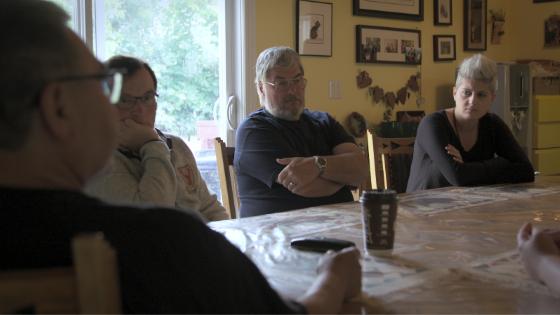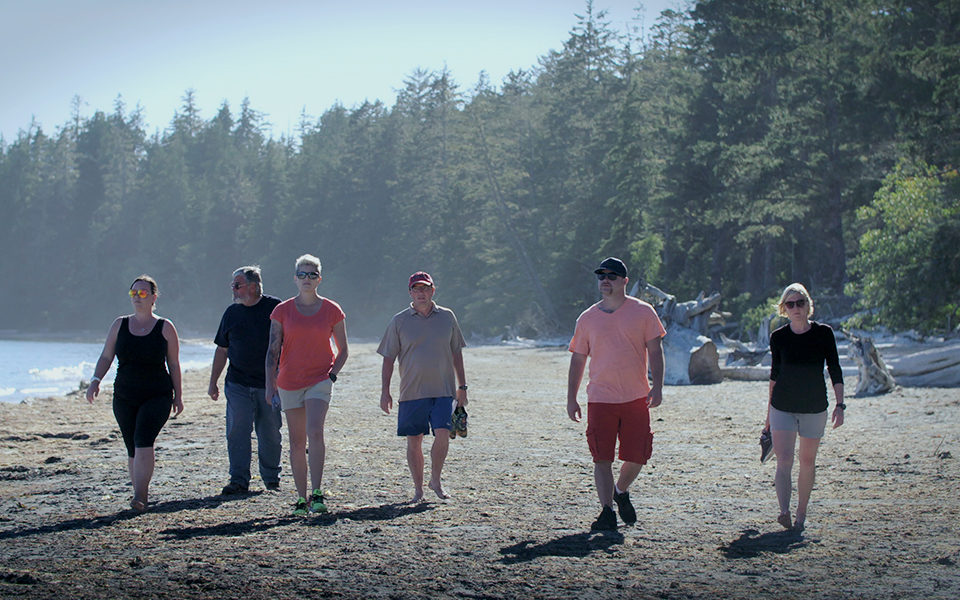On a grey street corner in Winnipeg, six strangers gather. They have no real connection to one another; three are male, three are female, and represent different generations. The only similarity is they are all white, and they all wear the same expression of discomfort.
This is the street corner in Winnipeg’s North End where they meet Michael Champagne, of the Shamattawa Cree First Nation. He looks younger than the other six, and in a better mood.
“So I’m curious to know,” he says to the onlookers, who are standing around the reds, yellows, whites and blacks of a medicine wheel painted on the otherwise dull concrete, “what experiences have you folks had with Indigenous people in Canada?”
The white participants don’t hold back. Their response is a stream of accusations centred around alcohol and drug abuse, and taking money from the government. There is a small sense of entitlement and arrogance the camera only barely picks up on before panning to Champagne. He doesn’t react poorly. He nods in a polite, understanding way.
It’s the opening scene from a new documentary, which aired on Aboriginal Peoples’ Television Network (APTN), which is receiving backlash from members of the Indigenous community. The documentary series, First Contact, attempts to educate non-Indigenous participants with prejudiced ideologies by bringing them to Indigenous reserves.
“This show is for white people,” says Chelsea Vowel’s official Twitter account Apihtawikosisân, a national bestselling author from Manitow-sâkahikan (Lac Ste. Anne). “I am tired of everything being for white people, including the way we are expected to perform our trauma while always being the better human.”

Jacqueline Jubinville, a spokesperson for APTN says First Contact is fulfilling its role in creating dialogue and connections between Indigenous and non-Indigenous communities.
“First Contact is a show for both Indigenous and Non-Indigenous Canadians,” says the official statement by APTN.
The statement goes on to say the conversation First Contact provides is a “step on the path to reconciliation.”
Stephanie Scott, an Indigenous producer on the series says there were times when co-producer Vanessa Loewen and she, both, questioned whether or not they were doing the right thing by making negative ideologies available to the public. The same ideologies Vowel calls “traumatizing” and “triggering as hell.”
“The show will never change the world,” says Scott, “but for everyone that I know that was involved, whether it was the producers, or the participants, or the people in the Indigenous community, they felt it was important to educate.”
Taking responsibility for emotional distress
Jeff Newman, First Contact’s director, did have resources set up in the reserves in case the dialogue did trigger trauma in the Indigenous peoples. He says he wanted to make sure he was responsible if someone did experience emotional distress due to the series.
Newman considers the series a reversal of colonialism. The participants did not visit the reserves to talk, they were taken there to listen. In the series, the participants listen to the Indigenous communities to fully understand the effects of colonialism, a viewpoint they didn’t know existed before.
When education falls short
Newman is most angered about the Canadian education system. But he insists he’s not upset as much with the individuals as he is with the colonial national framework and the gaps in education on Indigenous issues.
“I was never taught anything about residential schools, I was never taught about the struggle,” says Ashley Mathieu, a participant on the series. “Even my partner’s daughter … isn’t being taught any of this in school.”
Mathieu goes on to say Canadians need to be taught Canada’s history of colonialism. Newman agrees, which is why he thought it important for the participants to hear first hand what colonialism has done to Indigenous peoples. But more education continues behind the scenes, in day to day life
